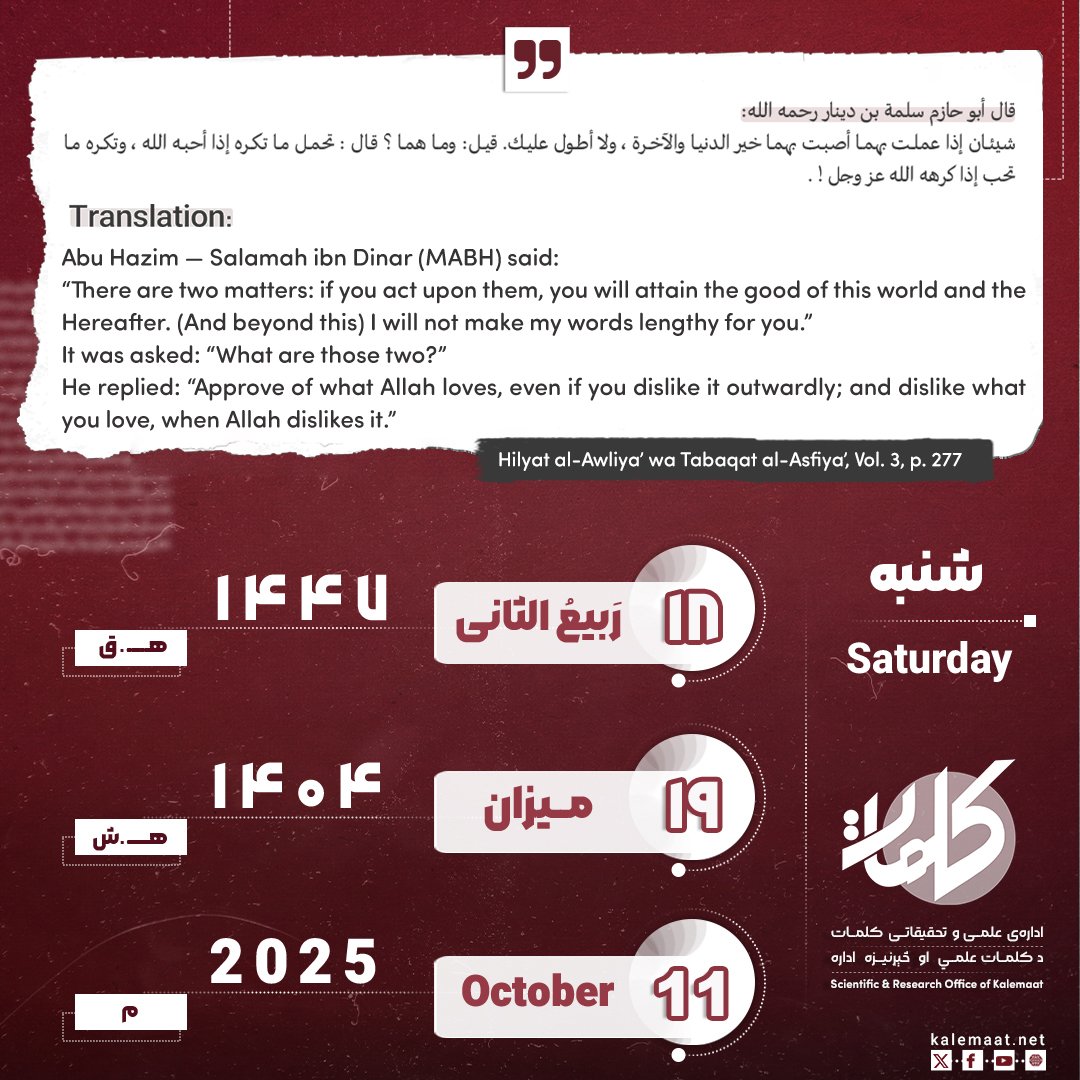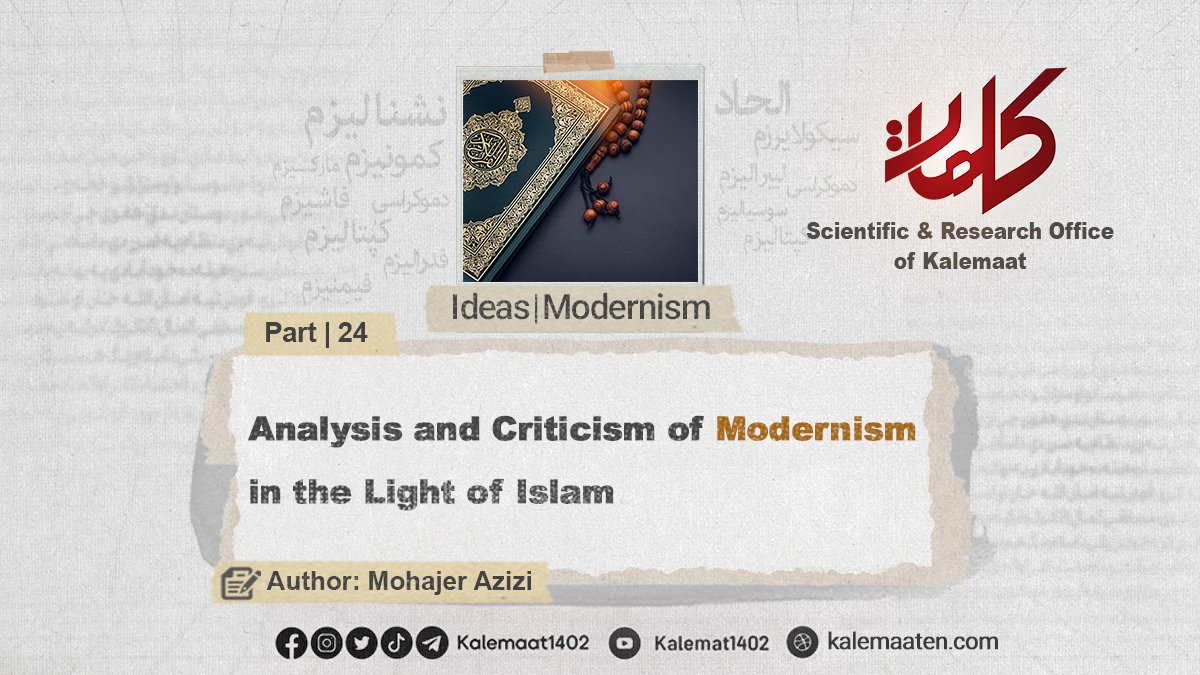Author: Mohajer Azizi
Analysis and Criticism of Modernism in the Light of Islam (Part 24)
Doubts of Modernists in Denying the Authenticity of the Sunnah
In the following, we will mention the reasons and doubts of the followers of Modernism in denying the authenticity of the Sunnah and provide reasoned and logical answers to rejecting their views:
-
First Doubt:
The followers of Modernism and the deniers of Hadith argue in order to reject and deny the authenticity of the Sunnah from the words of Allah, which says: «ما فرطنا فی الکتاب من شیء» Translation: “We have not omitted anything in the Book.” [1]
And also: «و نزلنا علیک الکتاب تبیانا لکل شیء» Translation: “And We sent down to you the Book as an explanation of everything.”
They say that these verses indicate that the Book of Allah encompasses all religious matters and any ruling that is needed in this matter is explained in detail in the Quran, so that there is no need for anything else like the Sunnah. They further add that when all the necessities and needs are explained in the Quran, where is the need for the Sunnah? If this is not the case, this indicates a violation of Allah’s promise in this verse.
Answer:
First: It should be said that some great and reliable commentators such as Sahib al-Tabari and Zad al-Muyassar, etc., have considered the Book to be the Preserved Tablet, according to a saying. If this is what is meant, the argument of the deniers of the hadith from this verse is completely invalid.
Second: If the meaning of “the Book” is the Holy Quran, then the Holy Quran is a comprehensive book that contains all the principles, rules and rulings of religion. Some of these rulings have been explicitly stated by Allah Almighty in the Quran, and some have been explained by the Holy Prophet of Islam (peace and blessings of Allah be upon him). It is clear that the duty of the Holy Prophet (peace and blessings of Allah be upon him) was not only to convey the verses, but also to “explain” the rulings of religion was part of his mission. As Allah Almighty says: «وَأَنزَلْنَا إِلَيْكَ الذِّكْرَ لِتُبَيِّنَ لِلنَّاسِ مَا نُزِّلَ إِلَيْهِمْ» Translation: “And We have sent down to you this Reminder (the Quran) that you may make clear to the people what has been sent down to them.” [2]
Therefore, what the Prophet (peace and blessings of Allah be upon him) has stated in the form of Sunnah is in fact an explanation of the Quran itself. Therefore, it can be said that the rulings of the Sharia, which are based on the Book and Sunnah, as well as the principles that are derived from them through consensus and analogy, all have their roots in the Quran and are not separate from it.
The Sunnah and Hadith of the Prophet (peace and blessings of Allah be upon him) are in fact his verbal and practical interpretation of the Quran. Imam Shafe’i (may Allah bless him) said in this regard: “In fact, the Sunnah is also taken from the Book of Allah, because the Book of Allah has made following the Sunnah of the Prophet (peace and blessings of Allah be upon him) obligatory upon us.” [3]
So, as a result, there is no contradiction between the fact that “the Sunnah is proof” and “the Quran explains everything”; because the Quran itself has clarified the validity of the Sunnah and the necessity of following the Prophet (peace and blessings of Allah be upon him).
Third: On the other hand, revelation is of two types: Matlu (general) revelation and Ghair Matlu (specific) revelation. The Sunnah of the Holy Prophet (peace and blessings of Allah be upon him) is Ghair Matlu (specific) revelation; as is indicated in the following verses regarding the revelation of the Sunnah and its validity is proven:
- «وما کان لبشر أن یکلمه الله إلا وحیا أو من ورآء حجاب او یرسل رسولا»
-
Translation: “It is not for any human being that Allah should speak to him except by revelation, or from behind a curtain, or by sending a messenger (angel).” [4]
In this verse, in addition to sending a messenger, an independent type of “revelation” is mentioned, which means Ghair Matlu (specific) revelation. [5]
- «و ما جعلنا القبلة التی کنت علیها إلا لنعلم من یتبع الرسول ممن ینقلب علی عقیبیه»
Translation: “We did not appoint the Qiblah (direction) towards which you were facing except to make it clear who would follow the Messenger and who would turn back.” [6]
Here, the meaning of “Qiblah” is Bayt Al-Moqadas (Jerusalem), and the command to turn towards it is attributed to Allah by the word «جعلنا», while nowhere in the Quran is the command to turn towards Bayt Al-Moqadas mentioned. It must be said that this command was conveyed through Ghair Matlu (specific) revelation (Hadith and Sunnah), and by attributing it to Allah, He has made it clear that the command of Ghair Matlu (specific) revelation is as obligatory as Matlu (general) revelation and it is proof). [7]
-
«اطیعوالله وأطیعوا الرسول» Translation: “Obey Allah and obey the Messenger” In this verse, Allah Almighty has commanded to obey the Messenger of Allah (peace and blessings of God be upon him) along with obeying Allah, which clearly indicates that the Sunnah and Hadith are proof.
- «فلا وربک لا یؤمنون حتی یحکموک فیما شجر بینهم ثم لا یجدوا فی انفسهم حرجا مما قضیت ویسلموا تسلیما»
Translation: “By your Lord, they will not believe until they make you judge in that in which they differ, then find no resistance in their hearts against your decision, and submit completely and with complete satisfaction.” [8]
This verse emphasizes that obedience to the guidance and sayings of the Messenger of Allah (peace and blessings of Allah be upon him) is obligatory and necessary, and even the path of a believer is tied to obedience to him (peace and blessings of Allah be upon him). So it is clear that the Sunnah and Hadith of the Prophet (peace and blessings of Allah be upon him) are proof and obligatory to act upon.
- «وَمَا يَنطِقُ عَنِ الْهَوَىٰ * إِنْ هُوَ إِلَّا وَحْيٌ يُوحَىٰ»
Translation: “He never speaks out of his own whims; his speech is nothing but divine revelation that descends upon him.” [9]
This verse clearly shows that what the Prophet (peace and blessings of Allah be upon him) says is either in accordance with the Holy Quran or is in accordance with the Sunnah and prophetic revelation. Therefore, whoever separates between the two and denies the validity of both has in fact gone beyond the circle of religion and fallen into the abyss of disbelief.
-
In many places in the Quran, the words of the previous prophets have been narrated, and following their guidance has been made obligatory for their nations, and those who refused to follow the prophets (peace be upon them) have been subjected to divine punishment. This also clearly indicates the authority of the hadith. [10]
What was narrated above were the narrative and Quranic evidences to refute this doubt. Below, we will also prove the authority of the Sunnah and hadith rationally:
-
The fundamental and basic rulings of Islam are usually stated in the Holy Quran; however, the details of these rulings and the method of implementing them are not given in the Holy Quran itself, but rather are stated in the hadith; for example, the method of performing the prayer, stating its times and number of Rak’ats, is not found in the Quran. If the hadiths are not an authority, then what will be the method of implementing «أقیموا الصلاة» Translation: “Establish the prayer”? If someone claims that «صلواة» is «تحریک الصلوین» “Moving towards prayer” in terms of its literal meaning, So, the meaning of “establish the prayer” is to stand in a standing position. What will you answer him? [11]
-
The Arab polytheists’ request was that the Book of Allah be revealed directly to us instead of being sent to the Holy Prophet (peace and blessings of Allah be upon him):
«حتی تنزل علینا کتابا نقرؤه» Translation: “Until you send down to us a book that we may read.” Certainly, in this case, the miracle would have been more obvious and the hope of the polytheists’ faith would have been greater. But Allah did not choose this method. Now the question is, if the hadiths are not proof, why was He insistent on sending a Messenger? In fact, the Prophet (peace and blessings of Allah be upon him) was sent because the book alone is not enough for reformation unless there is a teacher who clarifies its concepts and meanings, and he himself is its scientific example. It is not possible to achieve this goal unless his every word and action is obligatory to follow.
-
The authority of the hadiths has been unanimously accepted by the entire nation. If all these people were misguided and no one except the modernists understood Islam for fourteen centuries, this question arises: How can there be a religion that is worthy of being followed if not a single human being has understood it for fourteen centuries? [12]
-
To what extent do the modernists and deniers of hadith who deny the authority of the Sunnah know about religious sciences and religious teachings? Do they have the ability to correctly translate and explain even a single verse of the Quran based on the principles of the Arabic language and the rules of interpretation? Undoubtedly, most modernists and deniers of the Sunnah lack the necessary scientific insight into Islamic sciences, and what they present is based on superficiality, following appearances, and following the whims of the ego, rather than on scholarly and jurisprudent understanding. So is it reasonable and logical to reject and deny whatever the ego and whims suggest, without properly understanding religious concepts, one of the fundamental and great foundations of religion (Sunnah) that is proven by clear and obvious reasons?
Continues…
Previous Part
References:
- Al-An’am: 38.
- Al-Nahl: 44.
- Qawat al-Adellah, vol. 1, p. 29.
- Al-Shora: 51.
- Muhammad Taqi Usmani, The Authenticity of Hadith, p. 4.
- Al-Baqarah: 143.
- Muhammad Taqi Usmani, The Authenticity of Hadith, p. 5.
- Al-Nisa: 65.
- Al-Najm: 3-4.
- Muhammad Taqi Usmani, The Authenticity of Hadith, p. 10.
- Ibid., p. 11.
- Ibid., p. 11.



